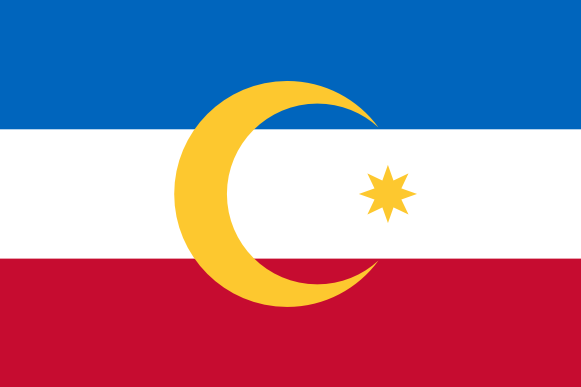Hakushiya wrote:Chewion wrote:Overall look good! Only two thing.
1. The POD is 1980.
2. Are you sure you want the military to only be that of IRL Singapore?
changed ‘em both - is this better now?Nationstates Name: Hakushiya
Nation Name: the Nusantaran Commonwealth
Capitals: Samarinda (executive), Palangkaraya (legislative), and Pontianak Kota (judicial)
Territory: Indonesia, Malaysia, Singapore, Timor-Leste, and Brunei
Population: 325 million people (estimate)
Official Language: English
Recognized Languages: Indonesian, Malay, Mandarin, Tamil, Cantonese, Hiri Motu, Tetum, Portuguese, and Hokkien
Flag:
National Anthem (optional): Nusantaraku (much like the Malaysian national anthem IRL but with some lyrical changes)
Head of State: Aidan binti Salman MATAHARI, President of the Nusantaran Commonwealth (surname capitalized)
HoS Picture: here
Head of Government: Cameron Yew-Loke TAY, Prime Minister of the Nusantaran Commonwealth (surname capitalized)
HoG Picture (If different from HoS): here
Legislature Name: the Kampung Nusantara (KPN)
Party in Power (If bicameral note who controls each): the center-left Nusantaran Coalition (BNN/Barisan Nasional Nusantara) holds a 64% majority in both chambers of the KPN
GDP Nominal: US$419.24 billion
GDP Nominal Per Capita: US$32,102
GDP (PPP): US$602.19 billion
GDP (PPP) Per Capita: US$29,101
Currency: the Nusantaran ringgit (NSR)
Domestic Policy Overview/Challenges:
>domestic polarization - the 1997 Asian financial crisis and the start of the COVID-19 pandemic in 2020 both resulted in sharper sociopolitical polarization along urban-rural lines leading to the BNN emerging victorious in the 2022 elections for the KPN with some promises made to actively work towards an increased sense of popular unison
>resolving existing inequalities - in spite of a woman being elected into the Nusantaran presidency in 2021 (the first time this has ever occurred) gender-related inequalities are still heavily pronounced in more conservative regions like Sumatra and Brunei where many locals abide to more orthodox interpretations of the Sharia (Islamic law)
Foreign Policy Overview/Challenges:
>the South China Sea dispute - the Nusantaran Commonwealth’s SEZ extends into the PR China-claimed South China Sea which has led to an increased Nusantaran military presence within the sea that aims to defend its own commonwealth against the Chinese military in a standoff
>support of a rules-based international order - eg. in a similar way to IRL Singapore the Nusantaran Commonwealth here enjoys robust ties with both the USA and the PR China on multiple aspects while also having active UN peacekeeping forces in its territory
Military Information (If different from irl you must indicate that here): the Nusantaran Armed Forces (PBN) were originally formed by a coalition of anti-Suharto rebels in Indonesia in 1982 but later became the constitutional military of the Nusantaran Commonwealth with the signing of the Treaty of Banjarmasin - as of 2024 there are 500,000 PBN members on active duty (30% of whom are stationed in the Nusantaran-administered areas of the South China Sea, 30% in the three national capitals, and the remaining 40% scattered elsewhere) with English, Malay, and Indonesian being among the most commonly-used languages between the members
Alliances (If different from IRL): the Non-Aligned Movement and ASEAN
History Changes (Subject to review and approval by OP and Co-OP):
>timeline of select major events from 1980 to 2020:
>>August 31, 1981: the Provisional Government of the Nusantaran Commonwealth (KSN) is founded in Jakarta by an anti-Suharto coalition
>>August 9, 1985: Indonesia, Malaysia, Singapore, and Brunei unilaterally sign the Treaty of Banjarmasin, installing the KSN into a position of sovereignty over the signatories’ territories (at this point reorganized into the Nusantaran Republics of Sarawak, Brunei, Sabah, Johor, Pahang, Kedah, Terengganu, Kelantan, Penang, Selangor, Negeri Sembilan, Malacca, West Java, East Java, Aceh, Sumatra, East Kalimantan, West Kalimantan, Maluku, Sulawesi, Singapore, West Papua, and Nusa Tenggara) with Devan Nair as the caretaker president and Goh Chok-Tong as the caretaker prime minister
>>November 11, 1985: elections for the Nusantaran Commonwealth’s presidency and legislature occur with B.J. Habibie elected as president and Goh Chok-Tong as prime minister
>>January 5, 1986: the first meeting of the Kampung Nusantara (KPN) occurs in Palangkaraya with Goh Chok-Tong officially inaugurated as the first Nusantaran prime minister and the settlements of Samarinda, Palangkaraya, and Pontianak Kota reorganized into separately-administered Capital Territories (CTs)
>>January 14, 1986: B.J. Habibie is officially inaugurated as the first Nusantaran president
>>February 1, 1986: the Nusantaran Commonwealth becomes a UN member
>>November 11, 1986: following months-long negotiations Timor-Leste becomes the first home-ruling Semi-Autonomous Territory (SAT) of the Nusantaran Commonwealth (a-la-Greenland)
>>January 2, 1987: the first metro system in the Nusantaran Commonwealth opens in Singapore with additional plans revealed for similar systems in Kuala Lumpur, Jakarta, Kota Kinabalu, and Jayapura
>>August 9, 1990: five years after the Treaty of Banjarmasin Singapore becomes the second home-ruling SAT of the Nusantaran Commonwealth
>>March 14, 1992: following the USSR’s collapse the Nusantaran Commonwealth establishes foreign relations with Ukraine, Estonia, Belarus, Russia, Latvia, Lithuania, Azerbaijan, Armenia, and Georgia
>>June 1993: the 1993 SEA Games are hosted in the Nusantaran SAT of Singapore
>>November 11, 1993: the Nusantaran Commonwealth establishes foreign relations with Yugoslavia and Greece
>>October 2, 1996: the Nusa Tenggara-administered island of Bali becomes a separate constituent republic of the Nusantaran Commonwealth known as the Nusantaran Republic of Bali
>>July 5, 1997: the Nusantaran Commonwealth’s government declares a nationwide recession as a consequence of the Asian financial crisis that year
>>November 1, 1999: multiple Nusantaran cities publicly declare their intents to bid for hosting rights to the 2012 Summer Olympics after Singapore and Johor Bahru’s joint bid for the 2008 edition gets submitted
>>July 13, 2001: Singapore and Johor Bahru’s joint bid to host the 2008 Summer Olympics gets defeated by Istanbul’s
>>January 8, 2004: the Nusantaran Commonwealth becomes SARS-free with the last cases being contained in East Kalimantan
>>December 26, 2004: the Nusantaran Republic of Aceh declares a state of emergency as a consequence of a tsunami affecting its populace heavily
>>July 6, 2005: Jakarta’s bid to host the 2012 Summer Olympics wins over London’s
>>May 13, 2008: the Nusantaran Commonwealth’s government declares another nationwide recession as a consequence of the global economic downturn that year
>>February 2, 2009: an unsuccessful coup attempt led by jihadist forces occurs in Samarinda
>>August 1, 2011: the Nusantaran Commonwealth establishes foreign relations with South Sudan following the latter’s independence
>>November 2011: the 2011 SEA Games are hosted in the Nusantaran cities of Bandar Seri Begawan and Kota Kinabalu
>>July-August 2012: the 2012 Summer Olympics are hosted in the Nusantaran Commonwealth (mainly in Jakarta with some spillovers into Surabaya for the seaside sporting events)
>>July 13, 2016: following an international verdict that Chinese claims over the South China Sea are invalid the PBN strengthens its defenses in the Nusantaran-administered parts of that sea
>>November 2017: the 2017 SEA Games are hosted in the Nusantaran city of Kuala Lumpur
>>January 11, 2020: the first cases of COVID within the Nusantaran Commonwealth are reported in the Nusantaran Republics of Brunei and Johor
>>February 1, 2020: many constituent republics of the Nusantaran Commonwealth undergo COVID lockdowns
>>April 14, 2020: the Nusantaran Commonwealth’s government declares another nationwide recession induced by the COVID lockdowns taking place in many of its constituent republics
Do not remove - ALPHA777
If you could keep the 2008 Olympics as being in Beijing and not Instanbul and also get approval to change the 2012 Olympics from the British player or change it back please, then this app would be good!















